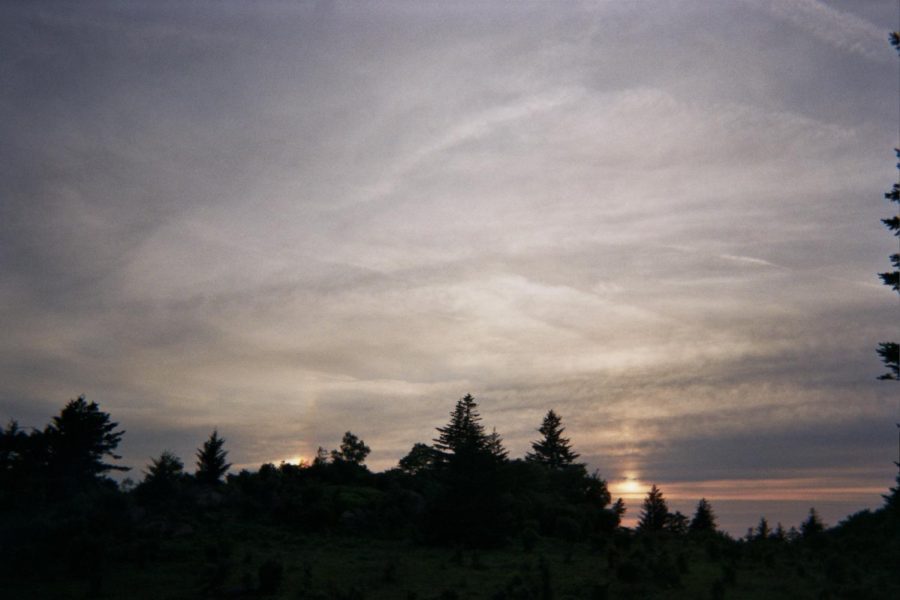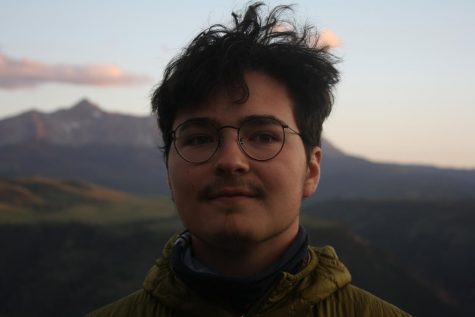Walking to Night Cricket City
A forest, sky and sun transitioning into the gloaming.
Sep 30, 2021
If you should know one thing about me, it’s that I am a walker. I go on a walk at least once every day, sometimes twice, often for hours.
Walking allows me to clear my mind, to reset. I’ve also (relatedly) found that I do my best thinking while I’m walking. Stuck on that homework problem? Take a walk. Writer’s block? Take a walk. Feeling anxious? Take a walk.
I especially love a fall walk — the gust of a cold breeze is invigorating. Most of all, though, I love the brief, chance encounters that come with a walk. I love the anonymity: the exchange of smiles with a passing stranger, the small thanking wave to a car stopped for me, the random kid who screams “Hi!” and giggles as I pass — oh, and the dogs, so many dogs.
Meaningless interactions on their face, these seconds of grace invariably remind me of something larger. They remind me that I’m not alone; that my worries are small. The infinity of people, of anxieties, of relationships, of stories, spread around the globe. This experience reminds me of a neologism I came across recently, one that I hope finds broader use. It is sonder: The profound feeling of realizing that everyone, including strangers passing in the street, has a life as complex as one’s own, which they are constantly living despite one’s personal lack of awareness of it.
If eloquence is defined as the most expensive idea expressed most clearly in the fewest syllables possible, then sonder is the jewel of eloquence.
As much as I love the moments of sonder on my day walks, night walks have always held a special place in my heart. The simple beauty of the night sky bespeckled by stars, the cool air and quiet serenity of a night’s walk always amazes me. But some walks are better than others.
Two nights ago, as I walked down the street, out of nowhere I was struck by a symphony of night sounds. Sounds that had been there all along, had I only been listening. I heard crickets, hundreds or maybe thousands of them. I heard a frog croaking and leaves rustling. It was like an entire invisible city of sounds.
After a little Googling later that night, I was amazed to find that I was not alone in my newfound cricket admiration. Apparently in China, as long ago as early antiquity, people breed crickets as pets, enthralled by their melodic chirps. I too was enthralled, as I stopped in the middle of the street, and I stood in total awe like an idiot, listening to crickets. The encounter, oddly enough, was deeply moving.
Moments like these make no sense. I’ve heard crickets chirp a million times, but last night, for a second, it did make sense. Yet, when I went out again the next night and walked to the exact spot where the previous night’s epiphany befell me, I felt nothing. I heard the crickets for sure, but I felt nothing special. You can’t search for a spontaneous mystical experience. Or as one of my favorite Jesuit writers Rev. Anthony De Mello once wrote of finding God, “Stop searching…there isn’t anything to look for. All you have to do is look.” But it’s hard to stop searching.
I think a lot of our worries boil down to the intractable problem of the present. We are beings cursed to search for meaning in a meaningless world. Nowhere is this clearer than in time itself. It’s truism to say that the past and present don’t really exist; all we have is now. And yet, the more we reason about it, the more elusive now gets. A second ago is the past, a second from now is the future. Where is now? Thinking about it too much makes my head spin.
But then there are moments, moments when you visit Night Cricket City, and you forget about everything. You forget about yesterday and tomorrow and where you are and what time it is and what you’re doing and — you feel present, present for a precious second.
For me, these moments of grace come when I brush up against the grand scale of the world. When I look up at the stars and remember that our entire world is literally a speck of dust, when I walk alone at night and suddenly realize that I am standing in the middle of an expansive ecosystem of nocturnal animals, or when I pass a stranger and feel a deep sense of sonder.
Moments like these reverberate to my core and reveal the insignificance of my individual being. I feel like a minuscule part of everything whole, one organism in an ecosystem, one person in society, a pile of atoms in the universe — all of it meaningless, but beautifully so. There is nothing left to think about, just listen to the crickets.














